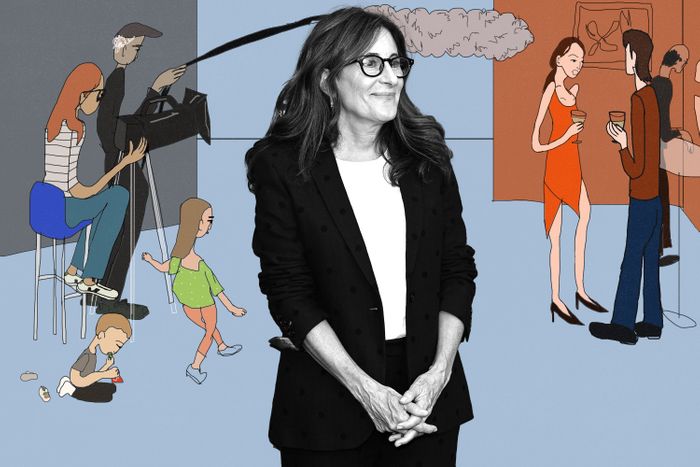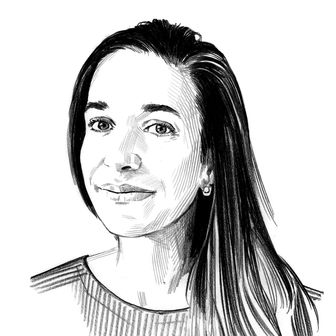
This article originally appeared in Brooding, a newsletter delivering deep thoughts on modern family life. Sign up here.
Since I was a teenager, I’ve been watching Nicole Holofcener’s films for clues about what to expect from adulthood. When I watched Walking and Talking in high school, I imagined what it would be like to date in my 20s. Lovely and Amazing (2001) and Friends With Money (2006) feature vivid women living out early motherhood and the everyday humiliations that come with creating art. (There was a period of time when all my friends were in graduate school and I was a waitress, and I thought about Jennifer Aniston’s character in Friends With Money every day.)
I’m now in middle age, and Holofcener’s work continues to be a looking glass into the future. Her latest film, You Hurt My Feelings, is about the little lies we tell the people we love to protect their pride and support their ambitions. It’s also about family life with a son who’s moved out but still comes home a lot — a life I hope to someday have.
Another way of saying this is that Holofcener’s films are Brooding canon; they are essential texts and mile-markers. She tends to work with actors across multiple projects, which lends a feeling of collaboration and closeness to her ensembles.
Holofcener raised her twin sons, Gabe and Joe, who are now 25, in Topanga Canyon, and later Venice, California. Today, she lives in L.A., near one of her sons; the other lives in Brooklyn. I spoke to Holofcener about family life, both hers and her characters’.
The relationship between Julia Louis-Dreyfus’s character and her 23-year-old son is beautifully drawn in You Hurt My Feelings. She’s affectionate in an intense way that I related to because my kids are still relatively young. Louis-Dreyfus talks about the relationship’s particular codependency in a recent interview. How did you write that relationship?
I’m not sure if I would say they have a codependent relationship. It seems like a typical 23-year-old interacting with his parents — he has his own apartment, he has his job, he has his dreams, but he will go back to his old bedroom now and then. That’s certainly the case with my own sons. They’re a little bit older, but my door is always open. At this age, there’s a lot of “push me, pull you” with young adults wanting to feel independent but at the same time, coming back to Mom and Dad.
That scene where he comes over because his girlfriend has broken up with him, and she reaches for him — that’s just what you do. It’s, “Come here, baby!,” completely unaware that he doesn’t want to feel like a baby. I’ve gotten that look, that hand pushing you away. I’ve gotten that hand a lot. When I’m offering leftovers, or a cuddle. My kids like to cuddle, but I think it has to come from them.
There’s a scene from Lovely and Amazing that absolutely burned into my brain the moment I saw it, when I was 19. It’s Catherine Keener’s character mingling at a Hollywood party, and she has nothing to talk about except that, ten years previously, she didn’t get an epidural when she was in labor. Something about that scene just floored me. It’s all she has. I was like, That’s something that can happen to a person. Was that kind of identity collapse that can accompany motherhood something that scared you?
No, I don’t think so. It just seemed like it was right for that character to hang her hat on some brave experience that she had. It was kind of a brag, right? Because she had nothing else to brag about. Her self-worth was always being tested, as an artist.
But I had terrible postpartum anxiety after I had my kids. And I probably talked about it way too much. It was 25 years ago, and it was much less known, or accepted. I got a lot of weird looks, like, Oh, she’s crazy. And I did feel a certain responsibility — I wanted to share my experience because I knew lots of other mothers could be having this, and I didn’t want them to feel as alone as I did. But God forbid I would have been talking about it to a couple of men at a party.
Would that have been so bad?
Well, I like to read the room.
Did you actually get diagnosed for postpartum anxiety at the time?
Yes. But I also had doctors say, “Wow, I’ve never seen this before.” Not knowing when and if it will ever go away, that is the terror. If someone had told me that it would last about a month, and then I’d be fine, that would have helped. And that’s what happened, if I remember correctly. It felt endless, but it might have been brief.
Did you have specific intrusive thoughts?
Thank God I didn’t have those. I just wanted the babies close to me, on me, near me, never away from me. I needed everyone around me. I just felt this impending doom and fear that something bad was going to happen. I still have that, but in a more normal way. I can function with my impending doom. But then I couldn’t.
What was it like directing while the kids were young? (The twins were born between Walking and Talking and Lovely and Amazing.)
When I was shooting Lovely and Amazing and Please Give — it was really difficult. Whenever I could, I’d have someone bring them to the set. This was before FaceTime and all that, and when I couldn’t see them, it was torture. But coming to the set was very exciting for them. Once when someone asked my son what his mother did for a living, he said, “I’m not sure, but I think it has something to do with Skittles.” Because all he cared about was the craft-services table. He was like 5 or 6 or something. And I was like, Good. Let him think I’m in the candy business.
Sometimes actors will have their kids on set, but I don’t suppose that’s feasible when you’re directing.
No, but I don’t become completely crazy and obsessed when I’m directing. I don’t shut down completely. I am actually able to function on many levels. I can talk to friends, and have visitors on the set, including my kids. And that’s really important to me. I like to include people and still be with the people I love.
When your kids were young, did you feel like you were part of a community of people who were all raising kids in a similar way?
My husband at the time, we’d go to the park and sit down near other families, and we’d always feel kind of isolated. I did have a small group of moms who were close friends, who I did feel comfortable with. But I was also one of the first parents to get divorced, in preschool. I remember looking at the roster of families and it was like, married, married, married, and then there were two phone numbers for my kids. And I knew half these people would break up someday, and trust me, they did. But I was the first. And that felt a little sad.
Parenting culture has gotten more intense in the last 20 years, I think.
Well, I’m a little envious because the equipment is so much better now. I’m like, Shit, I didn’t have a stroller that folded up into a square, and an attractive crib. But there’s an intensity nowadays, yeah. Maybe we’re realizing how easy it is to fuck up our kids, more than we realized before. Parents are more hypervigilant about not making mistakes. So then comes the helicopter parenting, which I reflected on in this movie. Parents want their kids to believe they can fly. But it’s like, Guess what, Mom, I can’t fly.
But is fucking up your kids really completely preventable? Parents today have this hubristic sense that if they really try, they can prevent any harm at all. But like you said, the world will cause harm. A kid is going to experience some kind of discouragement that their parents can’t control.
I don’t think you can know the ways in which your kids will blame you for the problems in their life.
It’s a mystery, right? You can’t anticipate that.
I mean, I could list all the things I wish I did differently, which I’m not going to do. But yeah, I thought I was doing my best, I thought I was doing everything a mother can do who loves their kids more than life itself, but there’s still damage there, from mistakes I made, or mistakes they think I made. I mean, I’m very close with my kids, but we’re not without our issues.
Who is without their issues? Is there anyone without their issues?
Oh, I see some people who don’t have issues.
Really? What are they like? Are they fun?
Yeah!
Is it a California thing?
No! No it’s not. It’s few and far between. But I do see families that have an easiness with their kids, and their kids have launched beautifully. Look — nobody goes through life without suffering, and I don’t wish suffering on anyone, but that part of their life is easy. But they can’t escape the rest.
More From This Newsletter
- Is Annoyance the Most Romantic Emotion?
- Trad or Not, We’re All Nostalgic for a Fake Past
- Should Kids Really Learn About Getting Rich?


